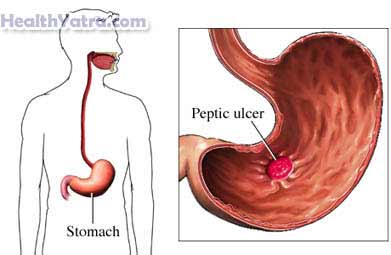परिभाषा
A peptic ulcer is a sore in the lining of the stomach or the first part of the small intestine. This area of the small intestine is called the duodenum. Peptic ulcers may be named by their location:
- Gastric ulcers are in the stomach
- Duodenal ulcers are in the duodenum
Treatment may include antibiotics, medications that heal the ulcer and protect the stomach, and lifestyle changes. Surgery may be needed for ulcers that bleed, obstruct, perforate, or don’t heal with other treatments.

का कारण बनता है
Upsets in the balance of stomach acid and digestive juices can lead to an ulcer. This can be caused by:
- हैलीकॉप्टर पायलॉरी (H. pylori) infection
- Use of nonsteroidal anti-inflammatory drugs (NSAIDs)
Less common causes include:
- Zollinger-Ellison syndrome
- विकिरण चिकित्सा
- Bacterial or viral infections
- शराब का दुरुपयोग
- ट्यूमर
- Other medicines such as steroids or medicines to treat osteoporosis
- Severe stress such as surgery, trauma, head injury, shock, or burns
जोखिम कारक
Factors that increase your chances of peptic ulcer include:
- H. pylori infection
- Taking NSAIDs for a long time and at higher doses
- Prior peptic ulcer disease
- सिगरेट पीना
- शराब का दुरुपयोग
लक्षण
Peptic ulcers do not always cause symptoms. Symptoms may come and go. Food or fluids sometimes make symptoms better. Having an empty stomach may make symptoms worse. However, symptoms can occur at any time.
लक्षणों में शामिल हो सकते हैं:
- Gnawing pain:
- May awaken you from sleep
- May change when you eat
- May last for a few minutes or several hours
- Feels like unusually strong hunger pangs
- May be relieved by taking antacids
- Nausea
- उल्टी करना
- भूख में कमी
- सूजन
- Burping
- वजन घटना
Ulcers can cause serious problems and severe abdominal pain. One problem is bleeding. Bleeding symptoms may include:
- Bloody or black, tarry stools
- Vomiting what looks like coffee grounds or blood
- कमजोरी
- चक्कर
A perforated ulcer is a break through the wall of the stomach or duodenum. It causes sudden and severe pain.
निदान
डॉक्टर आपके लक्षणों और चिकित्सा इतिहास के बारे में पूछेंगे। एक शारीरिक परीक्षा ली जाएगी।
परीक्षण में शामिल हो सकते हैं:
- Rectal exam and stool guaiac test
- Blood test, stool test, or breath test
- एंडोस्कोपी
- Upper GI series
- बायोप्सी
उपचार
Talk to your doctor about the best treatment plan for you. Treatment options may include one or more of the following:
दवा
आपका डॉक्टर सुझा सकता है:
- Antibiotics if an infection is present or possible
- Over-the-counter antacids
- Proton pump inhibitors
- H-2 blockers
- Medications to coat ulcer
- Medications to protect stomach against NSAID damage
जीवन शैली में परिवर्तन
You and your doctor will discuss lifestyle changes. These may include:
- Quit smoking. Smoking worsens symptoms and slows healing.
- Limit alcohol intake.
- Avoid NSAIDs. This includes over-the-counter drugs like aspirin and ibuprofen.
Surgery and Endoscopy
Surgery and/or endoscopy may be recommended for:
- An ulcer that won’t heal
- Recurring ulcers
- A bleeding ulcer
- A perforated ulcer
- Problems with food passing out of stomach
एंडोस्कोपी
This may be done to stop bleeding. A thin, lighted tube is inserted down the throat into the stomach or intestine. Heat, electricity, epinephrine, or a substance called fibrin glue can then be applied to the area. This should stop the blood flow.
सर्जरी
Surgery for peptic ulcers is rare, but it can greatly reduce acid production. Common procedures include:
- Removal of the ulcer
- Removal of part of the stomach or small intestine
- Tying off the bleeding blood vessel
- Taking tissue from another part of the intestine and oversewing the ulcer
- Cutting part of the nerve that goes to the stomach to reduce acid production
रोकथाम
To reduce your chance of getting H. pylori infection:
- Wash your hands after using the bathroom and before eating or preparing food.
- Drink water from a safe source.
- Don’t smoke. Cigarette smoking increases the chances of getting an ulcer.
To reduce your chance of getting a peptic ulcer from NSAIDs:
- Use other drugs when possible for managing pain.
- Take the lowest possible dose.
- Don’t take drugs longer than needed.
- Don’t drink alcohol while taking the drugs.
- Ask your doctor about switching to medicines less likely to cause ulcers. Talk to your doctor about taking other drugs to protect your stomach and intestine lining.
- Don’t smoke. Cigarette smoking increases the chances of getting an ulcer.
